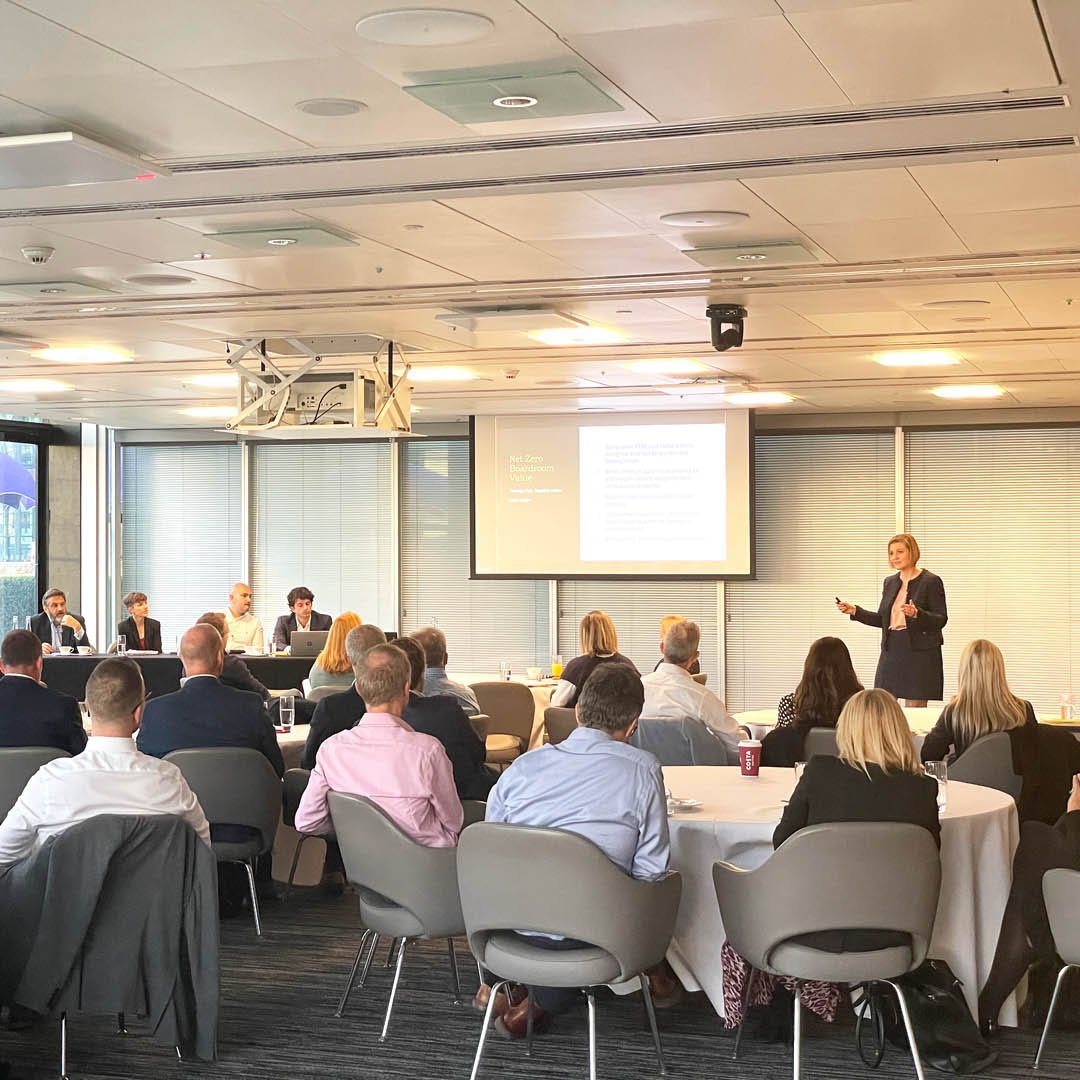Race to Net Zero: Advice on Becoming Carbon Neutral
A view to the future with a view of London
Net zero. It’s one of those perennial business challenges that’s become a major talking point for seemingly every organisation you care to speak to. How to do it. When to do it. Where to start. Like any journey, you sometimes need to be pointed in the right direction by people who are further along than you are. This was the objective of Investigo Executive’s inaugural leadership summit, the Race to Net Zero, on Wednesday 21st September.
We were privileged to be joined by four leading experts in net zero – Dax Grant, Alex Avila, Stuart Bowman, and Edith Blennerhassett – on the top floor of our London HQ, at 10 Bishops Square. While we enjoyed breakfast with a view, our speakers shared insights and advice from their organisations’ net zero journeys. In the first in our series of blogs following the event, here are their top tips to help you on the road to net zero.
Create the culture and take your time
To Dax Grant, CEO of Global Transform, ESG (Environmental, Social and Governance) can’t be a regulatory tick-box – it needs to be tied into everything you do so that the attitudes and practices in your organisation are all geared towards net zero. No matter what their size, businesses now recognise their contribution to society. It’s not all about the big actions; the little steps that we take as a collective all add up to a big difference.
Net zero’s not just a quick target; it’s a change in the way we think. Remember that it takes time to embed ESG into the culture of your organisation. Consider your impact both locally and globally. Think about the demands you should be making of all your partner organisations, from suppliers to distributors to clients.” By building the conversation about ESG all the time, you can change mindsets for the better”, so Alex Avila, Head of Plan Zero Consulting and e-Mobility, at Mitie shared.
Strategise and build your board with net zero in mind
To give ESG a platform in your organisation, make sure it’s front of mind when you’re constructing your board or any other committee, including your investment committee. How are you building the net zero conversation into your principles? To make real improvement, you need to have detailed and specific conversations about ESG.
Devise an actionable strategy with clear milestones to deliver your outcomes. This should include using smart technology such as electric vehicle charging points and onsite solar panels to get the most out of your assets; reducing and optimising energy demand; and electrifying your operations.
Plan, collaborate and get started
Quite often, the first steps on a long road can be the most difficult. There’s a perception that achieving net zero is a costly and difficult process, which causes many organisations to delay acting. Remember that this doesn’t have to be the case providing you have a plan in place.
Net zero is not something that is achieved in isolation by one specific area of the business. Every part of your organisation will have a part to play in delivering your objectives, including procurement, finance, and estates, so include them all in your strategic discussions.
All our actions are closely tied together. Everyone in your supply chain will have an environmental impact on your operations, and you theirs. That’s why you all need to be on that journey. There’s no use in putting certain carbon reducing measures in place if their impact will be undermined by another area of your operations, according to Stuart Bowman, Development Director, Breathe.
Edith Blennerhassett, Sustainable Building Services (MEP) Leader at Arup states the obvious, which is so often overlooked; begin with a clear understanding about which actions will reduce the environmental impact of your real estate and your carbon footprint. If you don’t understand what those are, actively reducing them will be frustrating and halt your progress further down the line.
Partner with other experts to achieve your goals
We’ll all need advice at some point in our journey, so talk to your network to find out how they’re approaching the challenges you face. No matter how well you’ve planned, there will be something you haven’t thought of, and the same goes for other organisations. Events like this give us the chance to share our knowledge.
Embrace circular economy thinking, then measure and monitor
Design out waste and pollution, keep your products and materials in use, and regenerate natural systems. Transform your buildings and assets so they’re more efficient, and reuse where possible to minimise waste. Keep track of your starting points and how you’re progressing. Monitoring the ESG criteria most relevant to your company and reporting your findings not only encourages you to be transparent, but also means that you know where you are on your journey.
Get funded
ESG is high up on the governmental agenda and there are many revenue streams out there for organisations looking to start their journey – whether public grants, hybrid funding, or soft loans. Before you get started, explore all the options for funding. Know where your funding’s coming from and feed your plans into the business case.
When the abstract becomes attainable
For too long, net zero has been an almost abstract concept; a corporate holy grail wrapped up in vision statements, company missions, and leadership platitudes. But through a strategic approach, engaging everyone inside and outside your organisation, and partnering with the right experts who have the treasure map printed on the backs of their hands, you’ll find that this holy grail is very much within your grasp. We know it’s a long road and that just when we think our destination is in sight, it seems to edge further away.
If you’re looking for your next senior role or for the right Net Zero or ESG leader to help you reach you objectives, please contact Matt Parkin.

